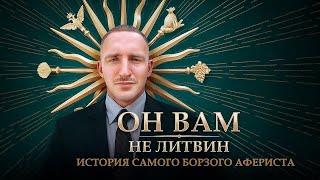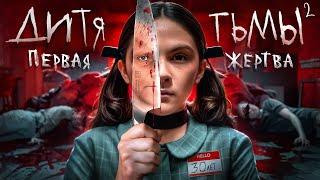
Dr. Lola Salem: Opera Needs to Change or it Will Die
Комментарии:

Just a little thought I keep having while listening to this: why is state subsidization viewed as "artifically propped up" as compared to market pressures? Is the market itself not artificial? Why do we view market pressures as inherently natural compared to the state?
Most agricultural activity in the western world isn't profitable, and relies on state subsidies to function. The production of food ought to be the most natural thing in the world, and yet our markets don't incentivize this. Interesting.

Anyone that talks about "white self humiliation" is seriously raising some eyebrows from me lol
Ответить
There is no lack of new operas in the present day . Since the beginning of the 21st century hundreds have probably been premiered worldwide . Opera is far from being dead or moribund .
Ответить
Opera is dead because the bel canto tradition is dead. Most modern opera singers sing way too bright and with too much vibrato.
Ответить
Great conversation with lots to reflect on. I do take issue with reducing kindness in reviews. As someone who has reviewed thousands of record albums, live performances, and theater presentations, I find that there are so many easy ways to be kind and make it very easy for my readers to see where on the scale this act lands, or rather may land for them. I am not a fan of the 'good and bad' concept as that implies the old capital 'A' arts review. Maybe there is a place for the canon discussion in reviews, but I wanted no part of that even if I may influence a few other people to help decide that if they choose. I have rarely seen anything bad... derivative, uninspired, sloppy, etc. and I can certainly review this in a constructive way (which to be fair was a point she made). So I think having the kindness in the criticism is a way to have those conversations she mentions, not just starting off with how bad something is.
Ответить
Every time I go to an opera (in Israel) I see more and more young people, though there are definitely still mostly old people
There was a new opera in Hebrew recently and it attracted a lot of people who don't usually listen to opera or even classical music in general

Europeans and european-derived people mostly stopped having children and mostly failed to enculturate the ones they did have, instead allowing TVs and the internet to take on that role. So the artistic traditions have all dwindled. It's unsurprising that immigrants from non-European traditions don't care too much either. Personally while I am concerned to learn, refresh and pass on musical traditions, I find opera less accessible, less participatory, and less meaningful than others.
Ответить
“Relevance” of the work/genre is not what is at play. When marketed properly the themes of the classic operas are at its core “human” and therefore relevant across time. We don’t argue the relevance of Dickens, Wilde, or Shakespeare just because they are “older.”
Opera companies imo have failed to adapt to newer technologies and revenue streams. Majority of people stream now and the ratio of those that stream an artist like Beyoncé versus attend her concerts are likely similar to opera. Less people are going to attend a live performance across genres. What opera composers/companies should be doing is creating nicely produced film adaptations, and providing them for streaming or even box office in the same way broadway musicals have. They should also be producing/marketing new operas for audio streaming as well, and IF a listener becomes so enthralled in the product, then they are more likely to buy a ticket to a show.

It seems to me, and I could be wrong, that the whole argument starts from an unchecked and unquestioned assumption. That somehow opera is a great art form and in some famous composer's view the greatest art form (combining music, theater performance, singing, ... ). From there it goes into a long excursion of basically asking "why don't they like us?", "what's wrong with them?" or "Are we selling it too hard?". Maybe one should be a lot more humble and ask "Is this opera really that great art form?" Compared to what? I am not asking because I hate classical music, on the contrary, J.S. Bach "Saint Matthew Passion" for example is hard to top in terms of musics, drama, text,... It has resisted the pass of time too. Not to give more examples on maybe other art forms, from theater to Ballet, Jazz, Blues, Folk musics of all kinds. All I am just humbly trying to point out, is that in the big scheme of things, maybe Opera is not really that great as everyone assumes. I should also say I love Mozart's operas too... But they are different I think.
Ответить
One thing I will say, I do not think that one should try too hard in being relatable to people. That usually results in unpleasant pandering. Instead we should make stories and music that leaves good impressions and value.
Ответить
This is very very good ....a lot of interesting topics that also reach outside of the opera issues..
Ответить
fascinating discussion many thanks for introduction to Reimann in my opinion you have opened up a whole arena of discussion regarding the connection between creative production and consumption and the historical moment. Does the tiredness of a lot of current creation point to the human endgame for instance?
Ответить
opera will never die. only fools who predict her death will die. I am convinced that in 200 years, Mozart, Bach and Beethoven will still be played, while all these anti-elitist fools will be long forgotten.if lumper proletarians don't like classical music, they don't have to listen to it. let them listen to their justin bieber and other anti-elitist garbage
Ответить
How about multiculturizing. China doesn't seem to have a problem with opera and traditional performances. It seems like it's just Europe.
Ответить
A Taylor Swift concert is the closest thing we have now to an Handel or Vinci opera, not so-called contemporary opera. On this last one I can safely say, as a heavy listener, that while scarcity is indeed a problem, at least, if I had to judge solely by the average quality of what hits the stage, we might be in one of the best epoch for the genre.
Ответить
The notion that Schubert was unsuccessful during his lifetime is not entirely true. His Lieder, dances and piano pieces were popular and made him quite some money.
Schubert died very young which is certainly one reason why his larger works didn't have the chance to penetrate the music institutions of his time which by nature are rather inert and conservative.

I disagree with some of the more strongly stated takes of the first half, although I respect the rationale for the arguments.
Thoroughly agree about the strange place vocal writing has in contemporary music world these days: the sense of voice-as-instrument instead of the longer standing view of instrument-as-VOICE

Concerning the conversation about education, while I would staunchly defend music education in all its forms, I think there is a risk of alienating people if one adopts the attitude that people don't 'understand' because they are essentially ignorant. There was a lot of this in the second half of the 20th century and it reduced the classical music audience because the lecturing attitude became tedious. I think art is at its best when it is a mutually respectful dance between audiences and artists. Sometimes the artist is ahead and the audience needs to catch up, something the artist has lost their way and the audience is right to ignore them. I heard someone lamenting the other day that Harrison Birtwistle wasn't more popular because culture is dumbing down. I have great respect for Birtwistle, but his music strikes me as exceedingly niche, and almost certainly will never be popular (and that's after it's had a fair bit of exposure and platform). I agree with the speakers about the importance of form in music and would welcome a discussion about whether there is something in the form of contemporary classical music that alienates audiences, without resorting to implying everything the artist does is correct and every objection and audience might have is wrong.
Ответить
No, Samuel, Opera isn't dying or dead, it isn't elitist and it certainly isn't expensive either. Those are all American unfounded prejudices about the art form. This art form has been around for over 400 years. So, something has to be great about it. In Europe everyone goes to the Opera, from the custodian to the billionaire CEO. In America too. And ticket prices are very, very affordable. People of all ages everywhere go to the Opera, including The Met, wearing whatever they want. Also, there are more professional Opera singers and composers today than ever before. The problem is mostly with European composers. The 20th century literally killed many of them off. Think WWI and WWII. And the ones who remained alive wrote ugly, mostly angry atonal Operas that the public simply dislikes. What we need is a serious Neo-Romantic Opera movement with composers writing beautiful, tonal post- Puccini Operas for the public with great, show-stopping arias, duos, trios, quartets and ensembles. Most Opera composers today avoid that very important show-stopping aspect supposedly for dramatic continuity's sake. But I suspect that's just an excuse for not letting the singer stand out. I call it composer greed. Both Wagner and Berlioz started that trend a very long time ago and now it's the norm. So, Opera composers and librettists are to blame if Opera becomes less and less popular, not anyone else. Absolutely NOT anyone else.
Ответить
Idiot inculte😂😂😂😂😂😂😂😂🤮
Ответить
I think it says something that 90% of the time I listen to opera I listen to Robert Ashley, which too many isn't even opera, but in Ashley's words "it can't be called anything else but opera." I think I like Ashley because it doesn't suffer the necessity for spectacle, whereas traditionally staged operas suffer from it more than ever due to their rarity and each being an "event".
Ответить
A most excellent foray into a host of arresting issues, not afeared of touching hot stoves, which I loved...
A deep question that inheres alongside having the courage to say a work is bad -- which I agree is perhaps the majority of our present problem -- is the still ever-vexing by whose standards?
I don't mean of course a relativist jibe, and well acknowledge there is a Western Canon and, derivatively, a canonical take. But that final leap of my syllogism bears very close inspection because there is a feeling of a vast fragmentation of both style and genre, medium and technique, over the past 40 years, of increasing variegation. This means that "a canonical take" is far more fraught today, I would guess, than in the times of a more homogenous assent to greatness.
I find greatness myself in "aesthetic complexity that has emotional resonance". IMHO that simple definition covers a lot of bases.
One other point to ponder is that no less an art critic than Camille Paglia has said the avant-garde is dead, that Andy Warhol killed it. If that is true, the implications for post-postmodern classical music may be similarly profound. (Or however one chooses to taxonomize the Wild West we see today.)

Hi Samuel,
It would be worth looking at Opera/Ballet Vlaanderen. Demographic is quite diverse age-wise, usually a packed house all season. They’re doing something right, with new creations and re-stagings. I guess it’s different than in North America given the fact there is a cultural heritage here in the EU, at least that’s been my experience. Have a look when you have a chance!

What a great conversation. This eloquently describes what I have quietly thought for many years but couldn’t articulate.
Ответить
I keep pre-bragging, and perhaps it’s immature, but I’ve been working on one symphony for four years, finally putting it in a score, I’m gonna cannon blast the avant garde away with a super accessible neoromantic epic that milestones the world musical canon, I’m calling it Symphony of the Forgiveness of Northern Aggression/Symphony of the Second Coming of Christ
It’s the integration of all musical high art canon, and acknowledgement of the time we live in, I resurrect Americas first forgotten black composer and disciple of Ives
Super avant garde in its scope but super melodic, with relevant counterpoint, two polarized themes battle throughout, super meta use of source material, political and spiritual acknowledgements I swear I’m so hyped for the full deal of this
Gonna literally drop the score off at my local symphony and make a meme out of it until it simply has to get played

I understand both speakers come from a conservative point of view. But, in the dialogue, some essential issues are ignored completely. Like for example the fact that art has an entirely different function now than it had in the 18th or 19th century. And the crucial issue of art in the 21st century is why art should be allowed to exist in the first place. Since there's an extreme reification of the industrial artistic object itself. Its seems to me that the approach they are taking here is flawed because it claims to be historical, but it doesn't analyse the material conditions of making of art in a broader philosophical sense.
Ответить
There is simply no objective criteria for valuing art. There is no ultimate time tested truth, and there is no point in trusting a nebulous concept of Faith that will attribute a just and perfect value to a work of art throughout the centuries. There is no small cabal of powerful patrons deciding what will survive and what will be forgotten, true... but the idea that artists are the sole keepers of cultural memory and impartial guardians of artistic merit is ridiculous. Artists, like all human beings, are victims of bias, ideology, politics, error, inertia, blindness, self-deception, and most importantly: CHANCE, CIRCUMSTANCE AND CHAOS.
You folks might be great musicians and all but uh... yeah... your general view is pretty obsolete and self-centered.

Why in the 20th century did it apparently become against the law to write an opera with an interesting story. Basically nothing happens in operas like Vanessa and Peter Grimes. Dreary static stories. And dreary music to accompany them.
Ответить
What is dead is opera writers trying to please the general public. The tiresome overuse of dissonance and experimental gimmicks, along with the seemingly deliberately dull libretti, is aimed at impressing academics and colleagues rather than audiences. Opera will revive when composers and librettists stop catering to a few etiolated professors and elitist snobs. Give us attractive music. This isn't 1911, you don't get extra points for writing atonal or just plain ugly music.
Ответить
Very interesting conversation. I like what Pablo Casals said: "When we speak of new music the accent should be on "music" not on new."
Ответить
I agree with Lola that state subsidizing of the arts, for all its virtues, can encourage composers to bore us with their political attitudes and fuss with various tedious forms of avant-gardism because the operas don't have to make a profit.
We should treasure the corpus of great operas written in the 18th and 19th centuries and only admit truly Worthy new works that have actually pleased audiences to the canon.

I use to say that opera is an excuse to write bad music to bad lyrics and have it bad performed. If you disahree..prove me wrong.
Ответить
The radical leftist idea that the reason someone does something better than someone else is solely because the latter person was opressed is destroying art. On top of that is the other readical leftist idea that all art is of equal quality. The only end result of those ideas is garbage art, IMO.
Ответить
Anti-art can never be as rich as art. What bugs me is so much money and time is being spent on the creation of anti-art which is taking away time and money that could be spent on creating art which could have given us amazing things. And the creation of anti-art requires neither much creativity nor brain cells, IMO.
Ответить
The canon is illegitimate because it was arbitrarily produced by white men. What a brain-dead idea, IMO. Sad that these simpleton ideas are being taught to our young people.
Ответить
A possible reason that the human voice has been devalued compared to how it was treated and regarded the past is that the cultural rot which has taken place, wherein nihilism has become in vogue, has naturally and logically lead to misanthropy. Humans are bad because they dominate the weak and ruin the planet, etc. Therefore what comes out of the human (the human voice) is bad. The musical instrument is one step removed from the voice in terms of the representation of humanness. The voice comes from the body, the bosom, which also nourishes baby humans. The rejection of the human body as good and beautiful is also in vogue in today's culture.
Ответить
Opera lives forever! You can't have the extreme super music drift away, there will always be people who want to go to nirvana!
Ответить
If being "inclusive" is the most inportant principle determining whether a work deserves attention, then merit and quality must take a back seat, and you end up where we are today, where the importance of art in general is highly diminished compared to the past, and where the ratio between garbage and profound art being produced is in the gutter as well.
Ответить
Exactly Lola, it is a zero sum game and the clearest way of defining the implemention "diversity" in the arts is that it is the ousting of white people from the arts. Plain and simple.
Ответить
As a fan of many genres of music I wanted to point out Opera does inspire composers in other genres. Carmina Burana for example has inspired composers of Symphonic Metal.
Ответить
We’re/are Terrence Blanchard’s operas any good?
Ответить
Don't forget that opera has split off into the Broadway musical, the movie musical as well as traditional opera. If that is taken into account it's possible to say that some evolution has occurred....a light popular form has survived and remained popular with the public. In the 19th century you had everything from Wagner to the most silly farce and everything in between...and they were all called opera.
Ответить
Opera has had a hard time figuring out how to be modern without being ugly and it has failed mostly. First you have to tell stories that people care about and things in the modern world they can relate to. Nico Muhly is onto something with Two Boys.
Ответить
Opera has indeed changed, but you may not readily recognize it. Example, you may recognize this opening: "So ya ... Thought ya ... Might like to go to the show ...", or this refrain, "... sure plays a mean pin ball!" Both are opera. Music is used to tell a coherent story. The "piece" lasts 44 minutes, or maybe 88 minutes, and has a consecutive story around a central concept. Yes, the concept album, writ large into a movie. Tommy. The Wall. These are called operas, because they are operas. No, they do not have the "weight" of Der Ring des Nibelungen, which is raised to reverence during its performance in Seattle. They are, however, operas with some popularity.
Ответить
Have you ever recorded the works based on Prynne? I spent a memorable evening with him on one of his very rare visits to NY.
Ответить
Broadway is a place that opera can try to survive.
Ответить
Blaring Belcanto vs Broadway warmth. Adapt the voice a few notches toward human warmth. Problem 80% solved.
Ответить
What do you think — is opera on its way out? Let me know below!
Ответить

























